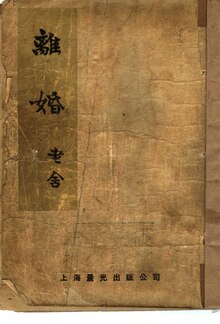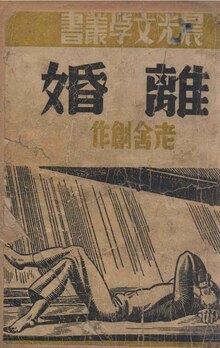 A 1933 edition of the novel A 1933 edition of the novel | |
| Author | Lao She |
|---|---|
| Language | Chinese |
| Set in | Chongqing |
| Published | 1933 |
| Publication place | China |

Divorce (simplified Chinese: 离婚; traditional Chinese: 離婚; pinyin: Líhūn) is a 1933 Chinese novel by Lao She, written in Chongqing, the temporary Chinese capital during the Second Sino-Japanese War.
The novel was also translated by Helena Kuo under another English title The Quest for Love of Lao Lee.
English translations
It was translated to English 2 times in 1948:
- Shu Ch'ing-ch'un (1948) . Divorce, Translated and Adapted from the Pekinese of Venerable Lodge. Translated by Evan King. King Publications.
- Lau Shaw (1948) . The Quest for Love of Lao Lee. Translated by Helena Kuo. Reynal & Hitchcock.
King's translation, no longer widely accessible, was unauthorized and heavily altered and abridged. Lao She who was in the United States from 1946 to 1949 had wanted the publication blocked, but his efforts were circumvented when King (pen name of Robert Spencer Ward) established his own publisher "King Publications" for the book. Lao She eventually took the matter to court and won the case. Meanwhile, he worked with Helena Kuo for an "authorized" translation, which also differed from the original but presumably with his approval. Kuo's translation was named The Quest for Love of Lao Lee to distinguish it from King's version.
Adaptations
- Divorce, a 1992 Chinese film starring Zhao Youliang
- Divorce, a 1999 Chinese TV drama starring Ge You
References
- Zhang, Yingjin (1996). The City in Modern Chinese Literature & Film: Configurations of Space, Time, and Gender. Stanford University Press. p. 295. ISBN 0804726825.
| Lao She | |
|---|---|
| Novels and major stories |
|
| Plays |
|
| Film adaptations |
|
| People | |
This article about a 1930s novel is a stub. You can help Misplaced Pages by expanding it. See guidelines for writing about novels. Further suggestions might be found on the article's talk page. |